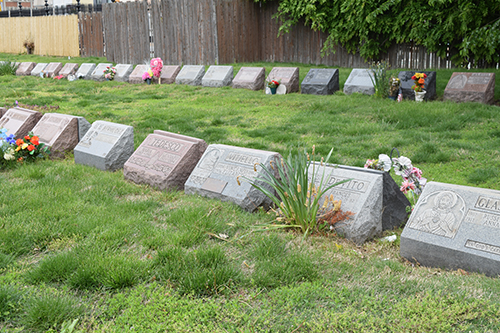
WINDSOR TERRACE — Proposed legislation that would allow the remains of deceased persons to be composted and reduced to soil — the way some recyclable food waste is handled — is getting a great deal of pushback from local Catholics.
If the bill introduced by state Sen. Leroy Comrie of Queens and Assemblywoman Amy Paulin of Westchester becomes law, New York would be one of the first states in the nation to allow composting of human remains.
Washington, which passed a law in 2019, is currently the only state in the U.S. currently allowing the process. On May 10, Colorado Gov. Jared Polis signed a human remains composting bill into law — effective in 90 days — to make that state the second to permit the procedure.
The New York State Catholic Conference is fighting to keep it from happening here.
Dennis Poust, interim executive director of the Catholic Conference, described human composting as “an offensive way to treat the deceased.”
The conference is urging Catholics to contact their state representatives to voice their opposition to the bill. The organization’s website (nyscatholic.org) contains a “Find Your Lawmakers” link that voters can use to obtain contact information about the lawmakers who represent them.
Bishop Nicholas DiMarzio has also spoken out against human composting. In last week’s “Put Out Into the Deep” column in The Tablet, the bishop wrote: “It is truly incredible how the respect for the human body has diminished.
“The Christian respect for the human body, however, comes from our faith that one day, we will rise from the dead at the end of time. Christ’s ascension into heaven reminds us of this fact, that his glorious body sits at the right hand of the Father in heaven, awaiting the end of time, the universal judgment, and the coming of all mankind before the Lord,” Bishop DiMarzio added.
If passed, the legislation would allow certain facilities, which would be licensed by the state, to accept human remains and place them in special chambers, containing wood chips, alfalfa, and other materials, to compost. The remains would be periodically rotated to speed up the composting and the process would take approximately 30 days. Once the process is completed, the families of the deceased would be able to claim the remains in an urn to take home or bury or scatter in a cemetery.
Poust predicted New Yorkers of all stripes, “would be really uncomfortable with the idea of composting human bodies the same way you would vegetable trimmings and eggshells.”
“People shouldn’t be treated like household waste,” he added.
Supporters of the bill are promoting it as an environmentally friendly, and less expensive, way to provide a final resting place.
“We are simply providing people with another choice. We respect that others have different views,” said Anna Swenson, outreach manager for Recompose, a Seattle-based firm that provides human composting services.
She said Recompose handles human remains in a respectful manner. According to U.S. Funerals Online, the average funeral in New York costs more than $8,000. Recompose has a price listing of $5,500.
The text of the bill in the state legislature reads: “The method will provide New Yorkers with the option of choosing an environmentally sustainable and cost-effective alternative to burial and cremation.”
John Heyer, co-owner of Scotto Funeral Home in Carroll Gardens, charged the legislation is being championed by private composting companies looking to make a buck.
“They are using people’s concern for ecology and are scaring people by exaggerating funeral costs so that they can make money themselves,” Heyer said.
He disputed the contention that funeral costs are prohibitive, saying that a direct burial — with no wake — can cost as little as $3,000. And Heyer added that funeral-home owners are willing to work out arrangements with families who cannot afford funerals.
Heyer, a Catholic who serves as the director of the Diocese of Brooklyn’s Annual Catholic Appeal and is a special assistant to the vicar for development, also opposes human composting on religious grounds.
“It shows a lack of understanding of the Resurrection,” he said.
